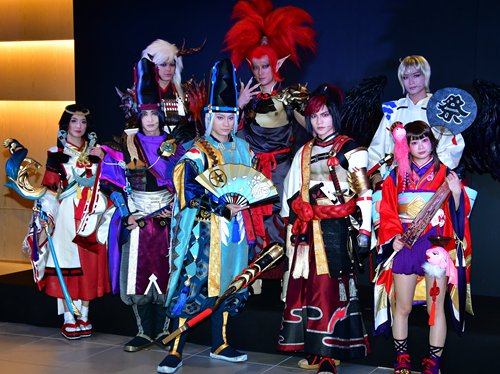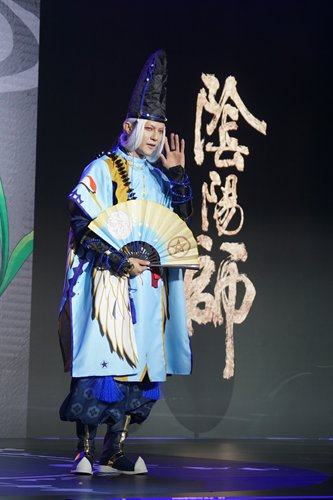
The cast of the Onmyoji musical pose for photo in Tokyo on March 9. Photo: VCG

Chinese actor Jiro Wang cosplays a character from the Onmyoji mobile game. Photo: VCG
When it comes to Japan's representative culture, most people may immediately think of things such as anime, kimonos or sushi. Recently, however, a different part of traditional Japanese culture - Onmyodo, or the Way of Yin Yang - has been gaining ground in China due to a new popular video game.
Onmyoji (Master of Yin and Yang) is a mobile roleplaying game produced by Netease Inc., NTES, a Chinese game company, that takes place in Japan during the Heian Period (794-1192). The game was officially released on June 1, 2016 for Android users and was later brought to iPhones three months later.
The game became a huge hit in the Chinese, Japanese and South Korean markets almost immediately after it debuted. According to Netease, the game attracted more than 10 million daily active users within its first 50 days.
Japanese inspirations
"I have to say, the art style and special effects during combat are really well done, as is the story and music, " netizen Reality winner/Dream loser, wrote on Zhihu, a Chinese question and answer platform concerning his impressions about the game.
The initial inspiration for this game can be traced back to The Tale of Genji, a novel written by Murasaki Shikibu (973-1025), a famous female writer from the Heian Period. The story, however, comes from the novel Onmyoji, a fantasy work by Japanese writer Yumemakura Baku that depicts extraordinary stories involving humans and ghosts.
"One of the most attractive points for the game Onmyoji is that it uses a lot of Japanese elements but is produced by Chinese, which puts to rest the argument that Chinese cannot produce things with a Japanese style well," netizen Seanli posted on Chinese game website Game Dog.
A deeper look at Onmyoji reveals that it is not just imitating a Japanese style game, but is actually an excellent combination of both Chinese and Japanese elements.
Though the concept of Yin and Yang is an ingrained part of Japanese culture, it actually originates from China. At their most basic, Yang means facing the sun, while Yin means having one's back to the sun. Ancient Chinese expanded the basic meaning of these two contrary concepts into a philosophy in which the natural order of the universe is explained in terms of interconnected dualities such as male and female, positive and negative and so on. The beginnings of Yin Yang theory can be traced to a time when China was made up of numerous independent tribal cultures. It continued to evolve and change over the centuries, reaching its full development as a complicated theory during the late Han Dynasty (206BC - AD220).
Inheriting the concept of Yin Yang from China, Japan further extended it to astronomy, economics, politics and divination. As more Japanese elements were introduced, it became more and more popular. In fact, Onmyoji (Lit: Yin Yang master) eventually became an official government position that had an important role when it came to calendar science and even official policy decisions.
"It is easy to see that this Chinese game company has combined two cultures by producing a Japanese-styled game themed after Yin and Yang. It reminds me of the Tang Dynasty (618-907), a time when Japanese came to China to study the dynasty's advanced culture and bring it back to Japan. Later, we imported the Japanese tea ceremony and the art of flower arrangement," Seanli wrote.
"This fusion of cultures makes the world a better place."
Growing franchise
The success of the game hasn't been limited to mobile devices, as adaptations such as shows and musicals based on Onmyoji have turned it into a multimedia franchise.
The live-action Japanese musical adaptation of the Onmyoji video game hit the stage in China on March 30 in Shenzhen, South China's Guangdong Province, before moving on to tour other major cities such as Shanghai and Beijing.
"I am now a die-hard fan!" netizen Shanxin wrote on Sina Weibo after seeing the musical.
Before the musical hit the Chinese market, it had already attracted the attention of fans in Japan when it premiered in Tokyo on March 9.
The musical received a lot of applause and appreciation from Japanese fans. Thirteen shows were performed in Japanese between March 9 and 18, with each performance selling out each time.
Starring famous Japanese actors such as Shinji Rachi and Yuki kimisawa, the musical has been welcomed by fans as a great adaptation of the game.
"It was such a good musical! Once again thank you guys," tweeted Ari, a Japanese netizen.
A movie adaption is also scheduled to hit theaters in China during the National Day holidays that start on October 1.
